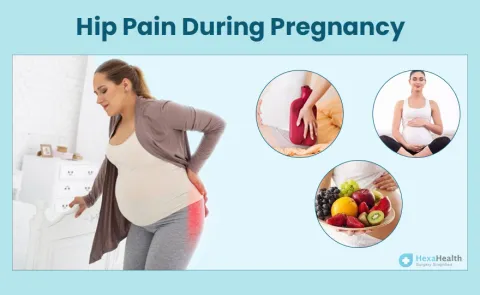Breathing Problem in Pregnancy - What to Expect, Solutions

Quick Summary
- Pregnancy can be a complex experience for many women.
- Shortness of breath is a common problem during pregnancy.
- Difficulty breathing during pregnancy occurs in 60% to 70% of healthy pregnant women.
Pregnancy can be a complex experience for many women. They may feel excited and joyful about bringing a new life into the world, but it has its physical and emotional demands. Some women may experience nausea, fatigue, and discomfort, breathing problem in pregnancy, making it difficult to feel positive.
Shortness of breath is a common problem during pregnancy. Difficulty breathing during pregnancy occurs in 60% to 70% of healthy pregnant women. It is a normal physiologic symptom of pregnancy. However, it may also indicate an underlying heart or lung disorder.
Why do Breathing Problems in Pregnancy Occur?
Shortness of breath or breathing problems can be a normal thing when you are pregnant. Some common reasons why breathing problems in pregnancy occur are as follows:
- Anaemia
- Asthma
- Hormonal changes
- Increased pressure on the diaphragm
- Pre-eclampsia
- Fluid buildup in lungs
However, this shortness of breath can sometimes signify a serious medical condition, such as a heart disease or pulmonary embolism, which is a blood clot in the lung.
Therefore, it is important to talk to your healthcare provider if you are experiencing a breathing problem during pregnancy, especially if it is accompanied by other symptoms such as chest pain, rapid breathing, dizziness, or fainting.
Your healthcare provider can evaluate your symptoms and determine whether they are normal during pregnancy or require further evaluation and treatment.


Breathing Problems in Various Stages of Pregnancy
Experiencing a breathing problem in early pregnancy or the latter part of pregnancy can be a cause of concern. Below we discuss in detail the various reasons for breathing problems during the three trimesters.
First Trimester
Breathing problems are not commonly reported during the first trimester of pregnancy, but they can occur in some women. Some possible causes of a breathing problem in pregnancy - first trimester include:
- Hormonal changes: During the first trimester of pregnancy, the body produces higher levels of progesterone, which can cause muscles in the diaphragm and lungs to relax. This can make it hard during pregnancy to take deep breaths.
- Anxiety or stress: The early stages of pregnancy can be a time of high anxiety and stress, which can cause rapid breathing or shortness of breath.
- Pre-existing medical conditions: Women with pre-existing medical conditions, such as chronic obstructive pulmonary disease or asthma, may experience breathing problems during the first trimester of pregnancy.
- Infections: In rare cases, respiratory infections such as bronchitis or pneumonia can cause breathing problems during the first trimester of pregnancy.
Second Trimester
Breathing problems in pregnancy can occur in some women during the second trimester. Some possible causes of breathing problems in the second trimester include:
- Uterine growth: The uterus grows and expands during the second trimester. It can push up against the diaphragm and lungs, making it more difficult to take deep breaths and causing a feeling of breathlessness.
- Hormonal changes: During the second trimester of pregnancy, the body continues to produce higher levels of progesterone, which can cause muscles in the diaphragm and lungs to relax.
- This can make it more difficult to take deep breaths and can cause a feeling of shortness of breath.
- Anaemia: Some pregnant women may develop anaemia during the second trimester, a condition in which the body has lesser red blood cells to carry oxygen to the tissues. This can cause fatigue and shortness of breath.
- Asthma: Women with asthma may experience worsening symptoms during the second trimester due to hormonal changes or other factors.
- Pre-eclampsia: It is a pregnancy-related condition characterised by high blood pressure and damage to organs such as the liver and kidneys.
- It typically occurs after the 20th week of pregnancy and can be life-threatening if left untreated. It can also cause shortness of breath due to fluid buildup in the lungs.
Third Trimester
Breathing problems are common in the third trimester of pregnancy and can be caused by various factors. Some possible causes of difficulty breathing in the third trimester include:
- Further uterine growth: As the uterus further continues to grow and expand in the third trimester, the pressure against the diaphragm and lungs increases. This makes the breathing problem in pregnancy acute.
- Hormonal changes: During the third trimester of pregnancy, the body produces higher levels of oestrogen and progesterone. These hormones help support the pregnancy and prepare the body for delivery.
- These hormonal changes can also impact a woman's breathing, making it more difficult for muscles in the diaphragm and lungs to relax.
- Baby's position: As the baby grows and gets into the position for delivery, it can put pressure on the diaphragm and lungs, making it more difficult to take deep breaths.
- Untreated Anaemia: Anaemia can also cause breathing problems in the third trimester. If left untreated in the second trimester, then pregnant women with severe anaemia have fewer red blood cells that carry less oxygen to their body tissues.
- This causes fatigue and shortness of breath.
- Heart or lung conditions: Women with pre-existing heart or lung conditions may experience worsening symptoms during the third trimester due to the added stress on the body.
- Peripartum cardiomyopathy: Also known as PPCM, it is a rare form of heart failure that occurs in women during the last month of pregnancy or up to five months after giving birth.
- It is characterised by weakened heart muscles, which can lead to symptoms such as shortness of breath, swelling in the legs, ankles, or feet, rapid or irregular heartbeat, and chest pain or discomfort.
- Pulmonary embolism in pregnancy: A serious and potentially life-threatening condition, pulmonary embolism (PE) can occur when a blood clot travels to the lungs during pregnancy or shortly after delivery.
- Pregnant women are at an increased risk of developing blood clots due to changes in blood flow and increased clotting factors.
Short Summary: Causes of Breathing Problems in Pregnancy
Breathing problems during pregnancy are a common issue that affects many women. The increased demand for oxygen by the developing fetus, changes in hormone levels, and changes in the woman's body due to pregnancy can all contribute to breathing difficulties.
Other possible causes of breathing problems during pregnancy include pre-existing respiratory conditions, such as asthma or allergies, and pregnancy-related conditions, such as preeclampsia, gestational diabetes, and obesity.
| Trimester | First Trimester | Second Trimester | Third Trimester |
| Causes of Breathing Problems During Pregnancy | Hormonal changes, anxiety, stress, infections, and pre-existing medical conditions | Hormonal changes, anaemia, asthma, pre-eclampsia, and uterine growth | Baby’s position, uterine growth, hormonal changes, anaemia, and heart or lung disease |
When Should I Call the Doctor?
You should call your doctor immediately if you experience any of the following symptoms:
- Sudden onset of shortness of breath
- Chest pain or discomfort
- Rapid or irregular heartbeat
- Persistent cough, which may produce blood-streaked mucus
- Fainting or dizziness
- Bluish tint to your skin, lips or nail beds
These symptoms could be signs of a serious medical condition such as pulmonary embolism or preeclampsia. It is important to get prompt medical attention to determine the cause of your symptoms and to receive appropriate treatment.
Conclusion
Breathing problems in pregnancy can frequently occur in various stages and trimesters. It is important to discuss any breathing difficulties you may be experiencing with your healthcare provider. They can help determine the cause of your symptoms and recommend the appropriate treatment.
In some cases, breathing difficulties during pregnancy may signify a more serious condition, such as pre-eclampsia. So, it is important to seek medical attention. The HexaHealth care team keeps you in touch with necessary information about important medical conditions and procedures. Get answers to your common concerns about pregnancy, childbirth and prenatal care here.
Frequently Asked Questions
Is it common to have a breathing problem in pregnancy?
Yes, having a breathing problem in pregnancy is common in different trimesters. Pregnant women may feel hard to breathe due to various reasons, such as anaemia, asthma, uterine growth, and the baby's position.
What causes breathing problems during pregnancy?
Breathing problems in pregnancy in different trimesters can occur for several reasons. It includes both normal changes in a woman's body like uterine growth, baby’s position, hormonal changes, pressure on the diaphragm and lungs, and underlying medical conditions, such as anaemia, asthma, and more.
Why do I have difficulty breathing during pregnancy?
The most common cause of difficulty breathing during pregnancy is the pressure the growing uterus puts on the diaphragm. As the uterus expands, it can push the diaphragm upward and decrease the space available for lungs to expand, making it harder to take deep breaths.
What are the signs and symptoms of breathing problems in pregnancy during the first trimester?
The signs of experiencing a breathing problem in pregnancy during the first trimester can be shortness of breath or difficulty breathing, chest pain or discomfort, rapid breathing or hyperventilation, coughing or wheezing, and fatigue or weakness. It can also be a sign of anaemia, asthma, or anxiety.
How can I prevent difficulty breathing during pregnancy?
Some suggestions to prevent difficulty breathing during pregnancy include maintaining a healthy posture, eating a healthy diet, doing light exercise, managing stress, and avoiding triggers. Sleeping on your side with a pillow between your legs can help take the pressure off your lungs and make breathing easier.
Why is it hard to breathe during pregnancy?
The most common reason behind experiencing a breathing problem in pregnancy is the pressure on the diaphragm. This pressure continues to grow more and more as the uterus expands. It decreases the amount of space available for the lungs to expand.
Is difficulty breathing in the third trimester a risk to the baby?
In most cases, difficulty breathing in the third trimester of pregnancy is not an immediate risk to the baby. However, if a mother has severe asthma, the baby may not get enough oxygen, which can lead to foetal distress.
How can I treat breathing problems in the 7th month of pregnancy?
You can practise deep breathing exercises, sleep in a slightly elevated position, or use a humidifier to reduce congestion and improve the breathing problem in the 7th month of pregnancy. Regular exercises, such as walking or swimming, can help maintain your lung capacity and prevent difficulty breathing.
Is it normal to have a breathing problem in an 8-month pregnancy?
Yes, experiencing a breathing problem in an 8-month pregnancy is normal. This generally happens due to hormonal changes, increased oxygen demand, or the weight of the uterus pressing on the lungs. But, do talk to your doctor about it.
When and why breathing problems in pregnancy are a threat to the mother?
Breathing problems in pregnancy may become serious if they are accompanied by symptoms such as chest pain, rapid breathing, dizziness, or fainting in the mother. In such conditions, they can pose a threat to both the mother and baby's health.
What should be done to prevent breathing problems in early pregnancy?
You can focus on good posture as you sit or stand and avoid stressful activities such as too much exercising and running errands or chores around the house. Regular physical activity, such as walking or prenatal yoga, can help improve your lung capacity and overall respiratory function.
Will breathing problems in pregnancy resolve after delivery?
Yes, if the breathing problem in pregnancy is not due to any underlying reason, then it goes away after a woman gives birth. Pregnancy-induced breathing problems may improve or go away after delivery. This is because the uterus will no longer be pressing on the diaphragm and the body's hormone levels will return to normal.
Pre-existing respiratory conditions such as asthma or chronic obstructive pulmonary disease (COPD), may continue after delivery. In some cases, pregnancy can worsen pre-existing respiratory conditions. And, it's important to continue monitoring.
Last Updated on: 2 March 2023
Reviewer

A specialist in Obstetrics and Gynaecology with a rich experience of over 21 years is currently working in HealthFort Clinic. She has expertise in Hymenoplasty, Vaginoplasty, Vaginal Tightening, Labiaplasty, MTP (Medical Termination...View More
Author

An enthusiastic writer with an eye for details and medical correctness. An avid reviewer and publisher. She emphasises authentic information and creates value for the readers. Earlier, she was involved in making ...View More
Expert Doctors (10)
NABH Accredited Hospitals (6)
Latest Health Articles





























 Open In App
Open In App